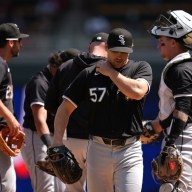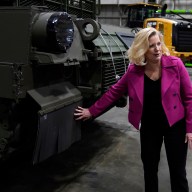“Torchwood: Miracle Day” asks the question: What happens if no one dies? The latest installment of the cult British sci-fi series, now airing on Starz, “Miracle Day” sparks a fascinating, philosophical conversation about overpopulation, dwindling resources, and the conflict such dire predicaments would cause.
Mekhi Phifer plays a CIA agent helping members of Torchwood — a secret British organization that investigates the extraterrestrial — uncover the mystery behind the day humans became immortal. He has a simple theory on such heady material — and it involves an RV.

Your character, agent Rex Matheson, got into an accident and should have died; thanks to Miracle Day, he’s still alive. What’s going on inside the mind of a dead man walking?
Rex is the kind of guy that when faced with challenge, he wants to conquer that challenge. The challenge is “I should be dead,” so that means the way he has thought about life up til now is wrong — and that is a challenge in itself. He’s thinking, “I want to make sure that we help the world, but listen — in figuring out this miracle, will I be a victim? Will [there be a point when] I just pass out and die?”
His black-and-white moral compass is definitely being tested. And it often puts him in conflict with members of Torchwood.
You see a conflict between the Americans and the guys from the U.K. We obviously started out not liking each other, and then we got thrown into this world where we have to work together, realizing that we have more in common than in differences. I think that speaks to the way of the world today.
How so?
I think if you expose yourself to life and different people — for example, I just went on a two-week trip around the country in my 40-foot RV. I started out in Los Angeles, landed in Orlando, and came back to Los Angeles. Now, I am a black man driving a 40-foot RV; people who drive past me and see this will go, “What is going on here?” But the more people you meet in the Midwest or these small towns, the more you learn that these people, or 90 percent of them, are great people. The rest are just assholes anyway. [Laughs] When you watch the news, or when you watch TV, or you live in a small world, you think that people are not as accepting as they are. But I tend to find that people are very accepting and open, and they will help you if you need help. So that’s what I love about doing the show — it meshes these worlds together and forces everyone to work together.
















